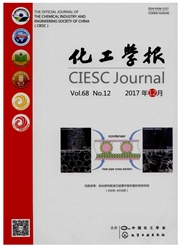

 中文摘要:
中文摘要:
为建立磁制冷机能效统一评价指标,弥补采用温跨和制冷量作为磁制冷系统性能评价标准的不足,在现有评价方法的基础上提出了新的室温磁制冷样机能效指标一炯效率。为了验证新评价指标的可行性,分别对2011年维多利亚大学公布的样机数据和2012年丹麦理工大学公布的样机数据进行分析计算,将以温跨.热源温度和温跨.制冷量形式给出的测试数据统一转换为温跨-冷量炯的形式,以实现对不同样机的能效进行客观评价;同时搭建测试平台对四川大学旋转式室温磁制冷样机在25、27及30℃工况下进行冷量炯、炯效率指标测试。实验结果表明,该室温磁制冷样机在25℃工况下,磁制冷机转速6r·mm-1时,制冷量为240W,最大冷量炯为3.26W。在剔除电机损失、机械损失、磁滞损失及涡流损失等因素的影响后,最大炯效率为0.039。
 英文摘要:
英文摘要:
A novel energy efficiency evaluation index, exergetic efficiency, was proposed to evaluate the performance of magnetic refrigerator rationally and compensate for the limitation in evaluating magnetic refrigerator system with available two indexes, temperature span and cooling capacity. To testify the feasibility of exergetic efficiency evaluation indexes, the experimental data by University of Victoria in the form of temperature span-heat source temperature curve and experimental data by Technical University of Denmark in the form of temperature span-cooling capacity curve were converted to the temperature span-exergetic cooling capacities. Furthermore an experimental platform was established based on Sichuan University magnetic refrigerator prototype. With the heat source temperature controlled at 25. 27 and 30℃, performance parameters of refrigerator such as cooling capacity, temperature span, cooling exergy and exergetic efficiency were obtained. Experimental results indicated that the cooling capacity of the magnetic refrigerator prototype could reach 240 W and its maximum cooling exergy was 3.26 W at heat source temperature 30℃ and 6 r.min-1. With the efficiencies of motor loss, mechanical loss, hysteretic loss and eddy current loss ignored, the peak exergetic efficiency was 0.039.
 同期刊论文项目
同期刊论文项目
 同项目期刊论文
同项目期刊论文
 Effect of copper ion implantation on corrosion morphology and corrosion behavior of LaFe11.6Si1.4 al
Effect of copper ion implantation on corrosion morphology and corrosion behavior of LaFe11.6Si1.4 al Studies of short-time and high-temperature annealing and magnetic property of LaFe11.4Si1.6 compound
Studies of short-time and high-temperature annealing and magnetic property of LaFe11.4Si1.6 compound The influence of different cooling processes on phase, microstructure, and magnetocaloric properties
The influence of different cooling processes on phase, microstructure, and magnetocaloric properties The system study of 1:13 phase formation, the magnetic transitionadjustment, and magnetocaloric prop
The system study of 1:13 phase formation, the magnetic transitionadjustment, and magnetocaloric prop 期刊信息
期刊信息
